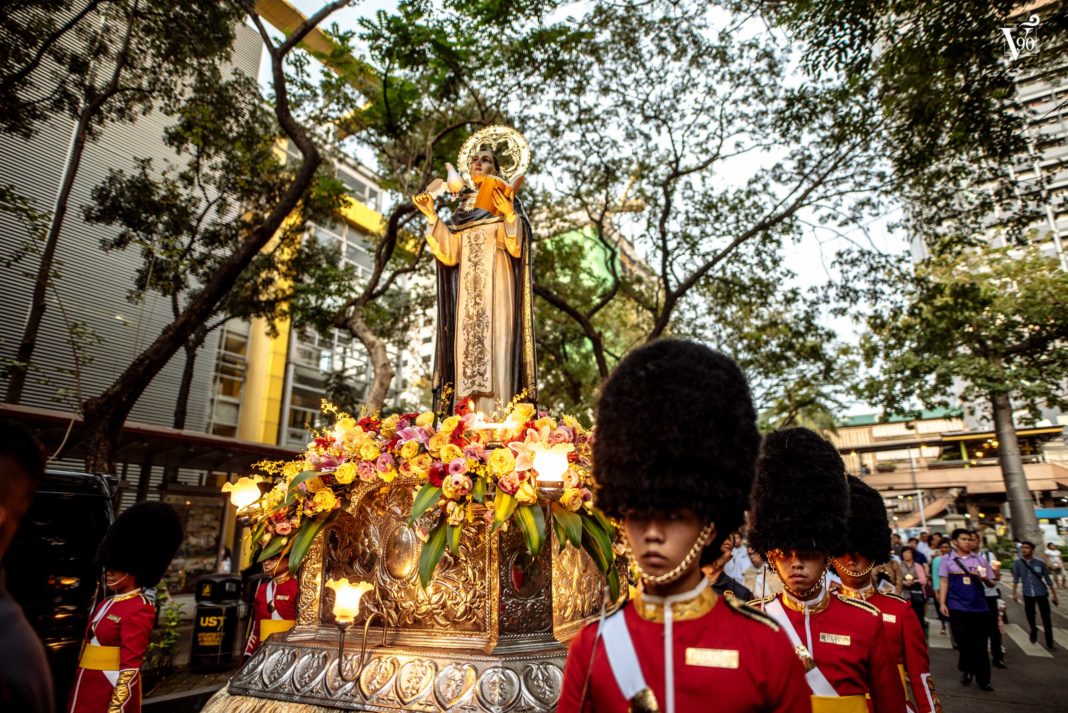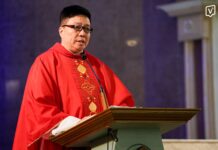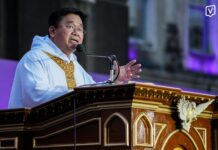WITH TIRADES against the Church and questions on the truth, St. Thomas Aquinas’s works, one of the bedrocks of Church Catechism, continue to shed light on contemporary issues today.
Fr. Rudolf Steven Seño, O.P., an instructor at the Faculty of Philosophy, said the culture of fake news can be fought by following Aquinas’s openness to a “bigger and more complete” truth.
“What is good about Aquinas is that he tries his best to know both sides of the issue. He does not only give the arguments that support his thesis [but] shows that the objections to his arguments are not totally wrong,” he said.
In recent months, Duterte has repeatedly criticized fundamental Catholic teachings, saying that Jesus Christ was “unimpressive” for letting himself be crucified and calling the doctrine on the Holy Trinity as “silly.”
Fr. Jose Antonio Aureada, O.P., member of the Commission on Higher Education’s Technical Committee for Catholic Religious Studies, said Thomas reconciled perspectives from Aristotle, Muslim and Jewish philosophers that enriched faith through mutual dialogue.
“Walang problema kay St. Thomas ang issues na nangyayari ngayon. And I think he would not condemn them but see to it, that when he seeks for a resolution, hindi nako-compromise ang faith,” Aureada told the Varsitarian.
Aureada explained that the Church follows Aquinas’s innovative spirit in contextualizing Christian doctrine and values with cultures and social issues.
“[Thomas] would cling to old values and [apply] it according to the needs of the current times… He has that experimental spirit but not to the point of compromising the core values of the Catholic faith… [`Y]on din ang strategy ng Simbahan ngayon,” he stressed.
Seño added that Aquinas’s philosophy calls for Filipinos to be more critical and open-minded in dealing with information to avoid prejudice.
“Aquinas was critical in [screening] the limited perspective of some information. This is in contrast to the culture of fake news wherein people are gullible to believe in anything without verifying its veracity. The point of this virtue is to see the bigger picture, not just a one-sided story,” he said.
In January, over 300 Facebook and Instagram accounts in the Philippines were removed by the social media company for violations of its community standards, including the use of fake accounts.
In a survey conducted by the Social Weather Stations last year, internet users in the country rose to 42 percent, with 32 percent of them using the internet for three hours or more a day. The survey also found that the perceived seriousness of fake news is directly related to the frequency of users online.
Philippine Philosophy, founded on Thomism
In his book titled “Mga Tomasino sa Pilosopiyang Filipino,” philosophy Professor Emmanuel de Leon tackled the historical development of Philippine philosophy, focusing on Thomasian philosophers who were mostly influenced by Thomism.
“In the history of philosophy in the country, we cannot deny that Philippine philosophy is founded on Aristotelian and Thomistic tradition. [T]he Thomasian philosophers used Aquinas as their foundation,” he told the Varsitarian.
He pointed out that the Thomasian philosophers followed Aquinas’s attitude in searching for truth by being open to other disciplines while remaining grounded on their scholastic roots.
“They were articulating the Thomas who was open to other perspectives, not the Thomas who was misinterpreted during their time as the ‘be-all and end-all’ of philosophy,” de Leon said.
De Leon said Aquinas plays an important role in deepening the academic discourse and opening the intellectual consciousness of students to other perspectives.
Faculty of Philosophy Asst. Dean Fr. Maximo Gatela, O.P. also said Aquinas’s philosophy is closely knit with the Filipino way of thinking, which is realistic and humane.
“Thomism is realistic… That tells us a lot also about Filipino Philosophy. Hindi [ito] masyadong lumilipad sa alapaap at hindi [rin] gumagapang sa lupa; dapat makatao,” he added.
According to Gatela, Thomism encourages Filipino values, which fosters humanity, family, God and community.
“A fulfilled and happy person is the opposite of a depressed person. [Thomas] has no answer to all our problems, but he gives us a sense of direction of human life as God has designed it,” Gatela said.
Aquinas and catechism
Fr. Cajetan Cuddy, O.P., an American Thomist from the Dominican Province of St. Joseph, said the Church’s catechism would be impossible to understand without understanding Aquinas’s principles.
“Aquinas is useful because he helps the Church appreciate, protect and expound the holy teaching that Jesus gave to his Church… [I]f you want to understand what the Church teaches, we need to read St. Thomas,” Cuddy said.
He added that Aquinas’s teaching is an invitation for the Church to “return to reality” and respond to issues in a society that has become detached from religious truths.
“Thomas and the Thomists are needed now because Pope Francis is calling us back to reality, back to God… [W]hat calls us to action are realities enlightened by reason,” he said in a conference last November titled “Rediscovering our Roots.”
In his greatest work Summa Theologica, Aquinas tackled the proofs of God’s existence, man’s ultimate purpose, faith and morality.
Aquinas wrote that the pursuit of knowledge and truth could only be found in God.
He studied in Monastery of Monte Cassino in Italy and was taken in as an apprentice by St. Albert the Great, who taught him Aristotelian philosophy.
He was canonized by Pope John XXII on July 18, 1323.
His feast day falls on January 28. He is the patron saint of Catholic schools and universities. with reports from Neil Joshua Servallos












